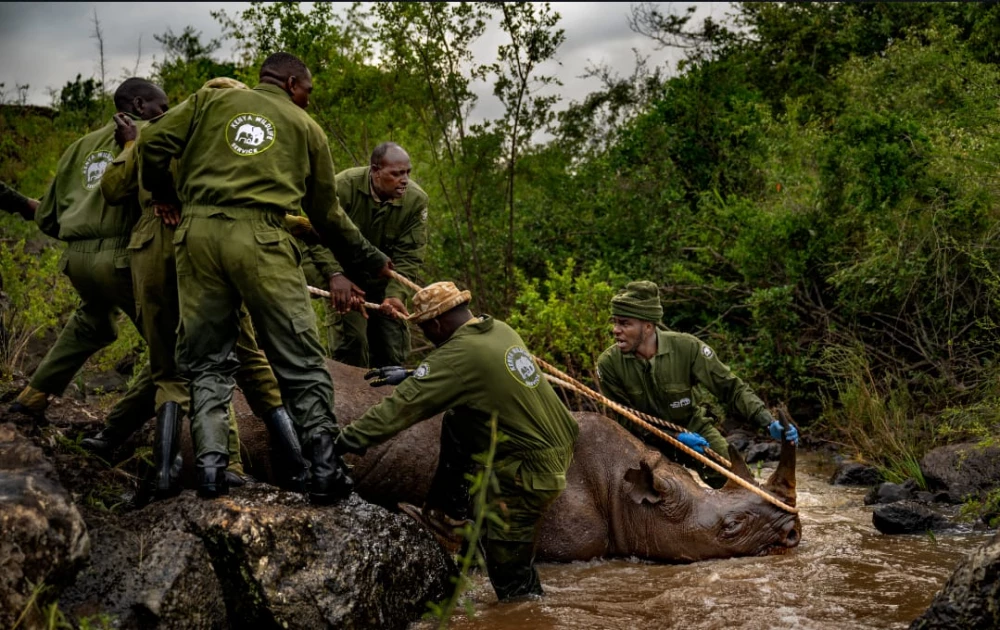Kenya surpasses 1,000 black rhinos in conservation milestone


Audio By Vocalize
As such, the Kenyan government through the Ministry of Tourism and Wildlife has established a founder population of black rhinos at the 58,000-acre Loisaba Wildlife Conservancy located in Laikipia, Northern Kenya. This is in a bid to widen black rhinos' holding area to create enough space for the species to multiply.
Kenya is famous for its remarkable rhino conservation and protection turnaround. In the 1970s Kenya had more than 20,000 black rhinos, but 20 years later there were only 400, a drastic reduction associated with rampant poaching.
A total of 21 black rhinos are being translocated; three are derived from Nairobi National Park, six from Ol Pejeta Conservancy in Laikipia County, and 12 from Lewa Wildlife Conservancy in Meru County.
The exercise, which was officially launched on 16th January 2024 at Nairobi National park by the Cabinet Secretary for Tourism and Wildlife Cabinet Secretary Dr. Alfred Mutua is expected to take 17 days.
According to Dr. Mutua, the action is supported by section 49 of the Wildlife Conservation and Management Act, 2023 which requires Kenya Wildlife Service (KWS) in collaboration with stakeholders to develop and implement recovery and action plans for the rare, endangered, and threatened species.
“We have successfully implemented 6 editions of the black rhino action plan and are now implementing the 7th edition of the Recovery and Action Plan for the Black Rhino in Kenya (2022-2026),” he said.
Mutua reiterated that the current action plan emphasizes population growth through rhino range expansion in suitable sites to decongest rhino populations in sanctuaries being managed above their ecological carrying capacity. This, he said, has led to increased mortalities from territorial fights with Nairobi National Park, Ol Pejeta, and Lewa Wildlife Conservancies being among them.
Munira Bashir, Kenya Programme Director, The Nature Conservancy (TNC) also in attendance at the launch, expressed satisfaction at the rate by which rhinos are multiplying and lauded the move to spread the wildlife in various parts of the country.
“As a proud Kenyan, I can say that today, there are more than 1,000 black rhinos, and the poaching that decimated populations has dropped to zero or close to zero year after year.
“This remarkable turnaround has been driven by Government determination coupled with the efforts and support of many local and international organizations, local communities, and most importantly a network of well-managed rhino sanctuaries on government-protected lands, private conservancies, and community conservancies,” she reiterated.
In Kenya today, tourism is the second economic earner after agriculture and all hands are on deck to protect its wildlife including the rhino.
Rhinos are important because they are a keystone species keeping their environment in biodiverse balance, and because stable rhino populations help drive the tourism industry and continue to raise Kenya’s global pro-environment brand.
But for Kenya’s rhino populations to continue to thrive, they need more space. Kenya needs to rebuild up to a stable population of 2,000 black rhinos, that’s the population size scientists say is necessary for black rhinos to survive in Kenya for generations to come.
Some of the country’s existing 16 rhino sanctuaries are nearing maximum capacity, so there is an urgent need to create new ones in areas that hold ideal conditions: ecologically appropriate habitat, effective security, and strong support from neighboring communities, hence the importance of translocation.
Kenya’s black rhino population ranks 3rd after South Africa and Namibia, while Kenya’s white rhino population increased from approximately 50 imported into the country from South Africa to reach the current population of approximately 971 as of the end of 2023.
At the translocation launch in the Nairobi National Park, also in attendance was Tourism and Wildlife PS Sylvia Museiya, John Ololtuaa of the State Departments of Tourism and Wildlife, Kenya Wildlife Service Board Chairperson Lt. Gen (Rtd) Walter Koipaton and KWS Director General Erustus Kanga.


Leave a Comment